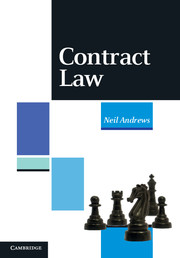Book contents
- Frontmatter
- Contents
- Preface
- Table of cases
- Table of statutes
- Table of statutory instruments
- Part I Introduction
- Part II Formation
- Part III Consideration and intent to create legal relations
- Part IV Third parties and assignment
- 7 Third parties
- 8 Assignment
- Part V Vitiating elements
- Part VI Terms and interpretation
- Part VII Breakdown and liability
- Part VIII Remedies for breach
- Part IX Illegality and public policy
- Part X The future
- Appendix: A who's who of contract law
- Bibliography
- Index
8 - Assignment
from Part IV - Third parties and assignment
- Frontmatter
- Contents
- Preface
- Table of cases
- Table of statutes
- Table of statutory instruments
- Part I Introduction
- Part II Formation
- Part III Consideration and intent to create legal relations
- Part IV Third parties and assignment
- 7 Third parties
- 8 Assignment
- Part V Vitiating elements
- Part VI Terms and interpretation
- Part VII Breakdown and liability
- Part VIII Remedies for breach
- Part IX Illegality and public policy
- Part X The future
- Appendix: A who's who of contract law
- Bibliography
- Index
Summary
INTRODUCTION
Summary of main points
(1) The holder of certain contractual rights (the promisee and assignor, B) can transfer the right to a third party (the assignee, C) without the promisor's (A's) consent. Thus, where A owes B a debt or other chose in action, the right-holder, B, can assign the benefit of this right to C.
(2) In the case of a statutory assignment, the assignment by B to C must be in writing, and B or C must notify A of the assignment.
(3) Such notice is also desirable in the case of equitable assignments.
(4) Certain rights are intrinsically incapable of being assigned because they are personal to the A/B relationship.
(5) A can preclude an assignment by inserting a prohibitory clause in his contract with B.
M. Smith, The Law of Assignment (Oxford, 2007)
EFFECTS OF ASSIGNMENT
Assignment has four effects (here, A is the promisor, B is the promisee, and C is the assignee):
(1) A, once notified, is obliged to pay C.
(2) To enforce the obligation created by the assignment in C's favour, C can sue A directly, without joining B as a party to the claim. This is true of statutory assignment (8.04) and of equitable assignment (8.05) of equitable choses in action. In the case of equitable assignment of a legal chose in action, such as a debt, the assignee must join the assignor as party to the claim (although there might be exceptions, where such joinder becomes unnecessary or it has been waived).
[…]
- Type
- Chapter
- Information
- Contract Law , pp. 224 - 232Publisher: Cambridge University PressPrint publication year: 2011



